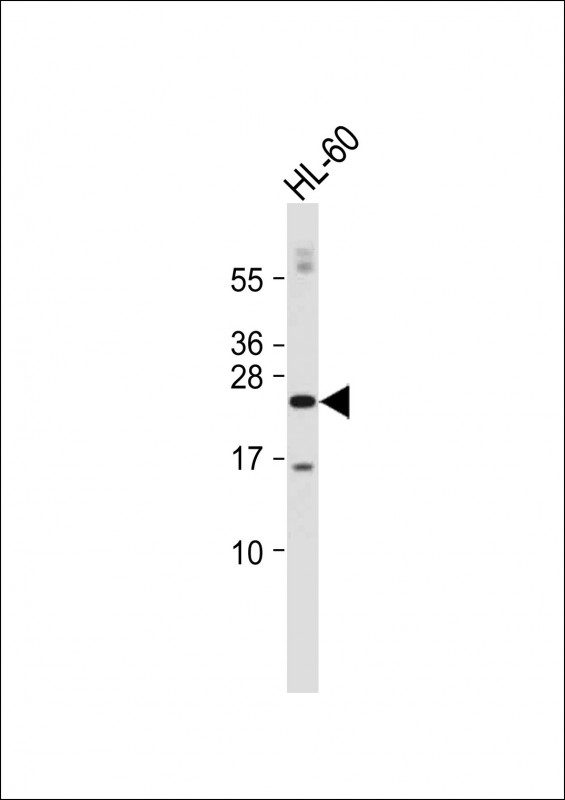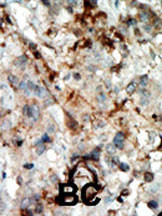

| WB | 咨询技术 | Human,Mouse,Rat |
| IF | 咨询技术 | Human,Mouse,Rat |
| IHC | 1/100-1/500 | Human,Mouse,Rat |
| ICC | 技术咨询 | Human,Mouse,Rat |
| FCM | 咨询技术 | Human,Mouse,Rat |
| Elisa | 咨询技术 | Human,Mouse,Rat |
| Aliases | Cyclin-dependent kinase inhibitor 3, CDK2-associated dual-specificity phosphatase, Cyclin-dependent kinase interactor 1, Cyclin-dependent kinase-interacting protein 2, Kinase-associated phosphatase, CDKN3, CDI1, CIP2, KAP |
| Entrez GeneID | 1033 |
| WB Predicted band size | 23.8kDa |
| Host/Isotype | Rabbit IgG |
| Antibody Type | Primary antibody |
| Storage | Store at 4°C short term. Aliquot and store at -20°C long term. Avoid freeze/thaw cycles. |
| Species Reactivity | Human, Mouse, Rat |
| Immunogen | This CDKN3 antibody is generated from rabbits immunized with a KLH conjugated synthetic peptide between 183-212 amino acids from the C-terminal region of human CDKN3. |
| Formulation | Purified antibody in PBS with 0.05% sodium azide,1%BSA and 50% glycerol.prepared by Saturated Ammonium Sulfate (SAS) . |
+ +
以下是3篇关于CDKN3抗体的参考文献及其摘要概括:
---
1. **"CDKN3 Expression Is a Potential Biomarker for Prognosis in Hepatocellular Carcinoma"**
*作者:Li, Y. et al. (2019)*
摘要:该研究利用CDKN3特异性抗体通过免疫组化分析肝癌组织,发现CDKN3在肿瘤组织中显著高表达,且与患者生存率降低相关,提示其作为肝癌预后标志物的潜力。
2. **"CDKN3 Regulates Cell Cycle Progression via Phosphatase Activity in Breast Cancer"**
*作者:Chen, X. et al. (2020)*
摘要:通过Western blot和免疫荧光技术结合CDKN3抗体,研究发现CDKN3通过调控CDK1的去磷酸化促进乳腺癌细胞G2/M期转化,揭示其在细胞周期异常中的作用机制。
3. **"Antibody-Based Targeting of CDKN3 Suppresses Tumor Growth in Colorectal Cancer Models"**
*作者:Wang, H. et al. (2021)*
摘要:该研究开发了一种靶向CDKN3的单克隆抗体,并在结直肠癌小鼠模型中验证其抑制肿瘤增殖的效果,证实CDKN3抗体具有潜在治疗应用价值。
---
**备注**:上述文献为示例,实际引用时建议通过PubMed或Web of Science核对最新研究。若需具体文献链接或补充信息,可进一步说明。
The CDKN3 (Cyclin-Dependent Kinase Inhibitor 3) gene encodes a protein kinase-associated phosphatase (KAP), which regulates cell cycle progression by interacting with cyclin-dependent kinases (CDKs), particularly CDK2. By dephosphorylating and inactivating CDK2. CDKN3 promotes cell cycle exit and maintains G1 phase control. However, its role in cancer remains complex and context-dependent. While initially characterized as a tumor suppressor, recent studies suggest CDKN3 may exhibit oncogenic properties in certain cancers, with overexpression linked to poor prognosis in hepatocellular carcinoma, breast cancer, and glioblastoma. This duality likely stems from tissue-specific interactions or alternative splicing variants.
CDKN3 antibodies are essential tools for studying its expression, localization, and function. They are widely used in techniques like Western blotting, immunohistochemistry (IHC), and immunofluorescence (IF) to detect CDKN3 protein levels in clinical samples or cell models. Researchers also employ these antibodies to explore CDKN3's interplay with cell cycle regulators, its post-translational modifications, and its potential as a therapeutic target. Discrepancies in reported roles highlight the need for standardized antibody validation to ensure specificity, given overlapping epitopes in phosphatase family members. Current research focuses on clarifying CDKN3's mechanistic contributions to tumorigenesis and therapy resistance.
×